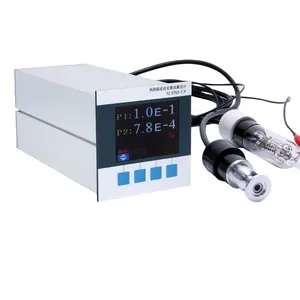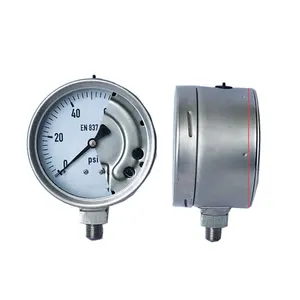Understanding the 50 MPa Pressure Gauge
A 50 MPa pressure gauge is an essential instrument in monitoring and measuring high-pressure values in various industrial applications. This type of gauge is designed to withstand and accurately display pressures up to 50 megapascals, which equates to approximately 7251.9 pounds per square inch (psi). The robustness of these gauges makes them suitable for environments where precision is paramount.
Types and Applications
The application of a 50 MPa pressure gauge spans across numerous sectors. In the realm of hydraulic systems, these gauges are indispensable for monitoring the pressure to ensure system integrity and safety. The petrochemical industry relies on them to keep a check on the high-pressure conditions prevalent in refining processes. Additionally, they serve critical roles in the fields of aerospace, automotive testing, and water treatment facilities, where pressure monitoring is crucial for operational efficiency and safety compliance.
Features and Materials
Constructed to deliver reliability, a 50 MPa pressure gauge often features a bourdon tube mechanism, known for its accuracy in high-pressure measurements. The materials used in manufacturing these gauges, such as stainless steel or brass, are selected for their durability and resistance to corrosive substances. This ensures longevity and consistent performance in harsh industrial environments.
Advantages of Using a 50 MPa Pressure Gauge
Utilizing a 50 MPa pressure gauge comes with several advantages. The primary benefit is the ability to measure very high pressures with confidence in the accuracy of the readings. This is crucial for maintaining safety standards and preventing equipment failure due to pressure inconsistencies. Moreover, the diversity in designs, from analog to digital readouts, provides flexibility in selecting the appropriate gauge for specific requirements.
Selecting the Right Pressure Gauge
When choosing a 50 MPa pressure gauge, it is important to consider the specific needs of the application, including the medium being measured and the environmental conditions. Gauges come in various dial sizes and connection types, offering versatility for different setups. While selecting, one should also consider the gauge's response time and potential exposure to dynamic pressures, which can influence the type of gauge required.
Conclusion
In conclusion, the 50 MPa pressure gauge is a vital tool for industries that operate under high-pressure conditions. Its ability to deliver precise measurements ensures that operations remain safe and efficient. With a variety of types and features available, these gauges can be tailored to meet the specific demands of any high-pressure application.































 浙公网安备 33010002000092号
浙公网安备 33010002000092号 浙B2-20120091-4
浙B2-20120091-4